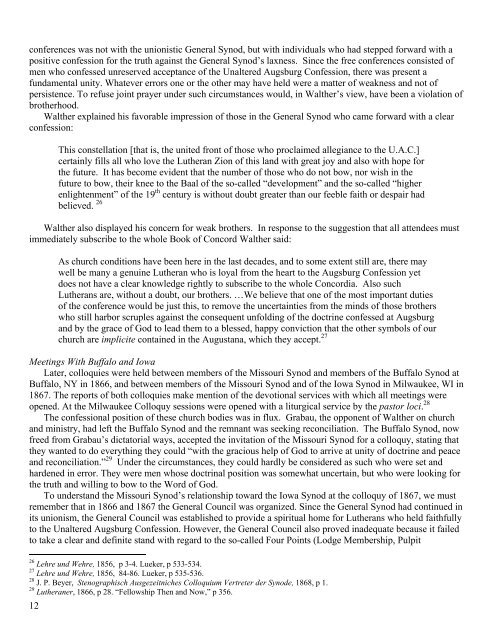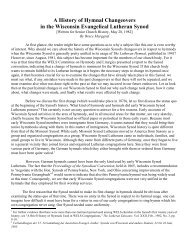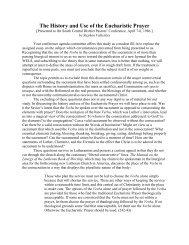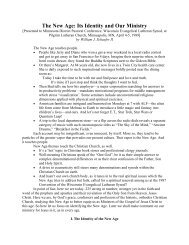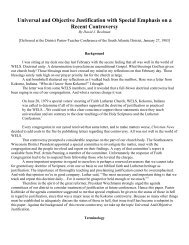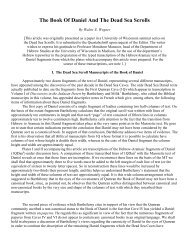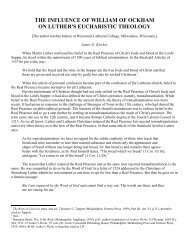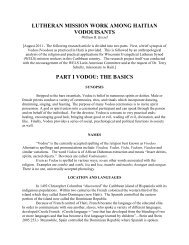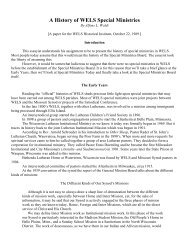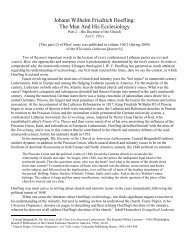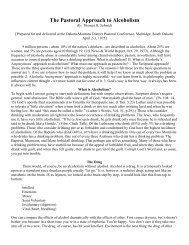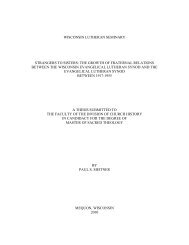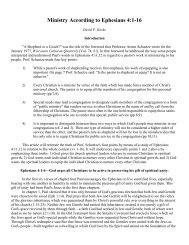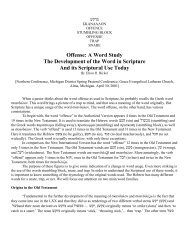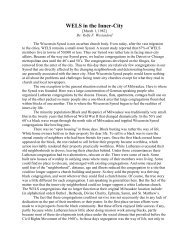The Synodical Conference and Prayer Fellowship - Wisconsin ...
The Synodical Conference and Prayer Fellowship - Wisconsin ...
The Synodical Conference and Prayer Fellowship - Wisconsin ...
Create successful ePaper yourself
Turn your PDF publications into a flip-book with our unique Google optimized e-Paper software.
conferences was not with the unionistic General Synod, but with individuals who had stepped forward with a<br />
positive confession for the truth against the General Synod’s laxness. Since the free conferences consisted of<br />
men who confessed unreserved acceptance of the Unaltered Augsburg Confession, there was present a<br />
fundamental unity. Whatever errors one or the other may have held were a matter of weakness <strong>and</strong> not of<br />
persistence. To refuse joint prayer under such circumstances would, in Walther’s view, have been a violation of<br />
brotherhood.<br />
Walther explained his favorable impression of those in the General Synod who came forward with a clear<br />
confession:<br />
12<br />
This constellation [that is, the united front of those who proclaimed allegiance to the U.A.C.]<br />
certainly fills all who love the Lutheran Zion of this l<strong>and</strong> with great joy <strong>and</strong> also with hope for<br />
the future. It has become evident that the number of those who do not bow, nor wish in the<br />
future to bow, their knee to the Baal of the so-called “development” <strong>and</strong> the so-called “higher<br />
enlightenment” of the 19 th century is without doubt greater than our feeble faith or despair had<br />
believed. 26<br />
Walther also displayed his concern for weak brothers. In response to the suggestion that all attendees must<br />
immediately subscribe to the whole Book of Concord Walther said:<br />
As church conditions have been here in the last decades, <strong>and</strong> to some extent still are, there may<br />
well be many a genuine Lutheran who is loyal from the heart to the Augsburg Confession yet<br />
does not have a clear knowledge rightly to subscribe to the whole Concordia. Also such<br />
Lutherans are, without a doubt, our brothers. …We believe that one of the most important duties<br />
of the conference would be just this, to remove the uncertainties from the minds of those brothers<br />
who still harbor scruples against the consequent unfolding of the doctrine confessed at Augsburg<br />
<strong>and</strong> by the grace of God to lead them to a blessed, happy conviction that the other symbols of our<br />
church are implicite contained in the Augustana, which they accept. 27<br />
Meetings With Buffalo <strong>and</strong> Iowa<br />
Later, colloquies were held between members of the Missouri Synod <strong>and</strong> members of the Buffalo Synod at<br />
Buffalo, NY in 1866, <strong>and</strong> between members of the Missouri Synod <strong>and</strong> of the Iowa Synod in Milwaukee, WI in<br />
1867. <strong>The</strong> reports of both colloquies make mention of the devotional services with which all meetings were<br />
opened. At the Milwaukee Colloquy sessions were opened with a liturgical service by the pastor loci. 28<br />
<strong>The</strong> confessional position of these church bodies was in flux. Grabau, the opponent of Walther on church<br />
<strong>and</strong> ministry, had left the Buffalo Synod <strong>and</strong> the remnant was seeking reconciliation. <strong>The</strong> Buffalo Synod, now<br />
freed from Grabau’s dictatorial ways, accepted the invitation of the Missouri Synod for a colloquy, stating that<br />
they wanted to do everything they could “with the gracious help of God to arrive at unity of doctrine <strong>and</strong> peace<br />
<strong>and</strong> reconciliation.” 29 Under the circumstances, they could hardly be considered as such who were set <strong>and</strong><br />
hardened in error. <strong>The</strong>y were men whose doctrinal position was somewhat uncertain, but who were looking for<br />
the truth <strong>and</strong> willing to bow to the Word of God.<br />
To underst<strong>and</strong> the Missouri Synod’s relationship toward the Iowa Synod at the colloquy of 1867, we must<br />
remember that in 1866 <strong>and</strong> 1867 the General Council was organized. Since the General Synod had continued in<br />
its unionism, the General Council was established to provide a spiritual home for Lutherans who held faithfully<br />
to the Unaltered Augsburg Confession. However, the General Council also proved inadequate because it failed<br />
to take a clear <strong>and</strong> definite st<strong>and</strong> with regard to the so-called Four Points (Lodge Membership, Pulpit<br />
26 Lehre und Wehre, 1856, p 3-4. Lueker, p 533-534.<br />
27 Lehre und Wehre, 1856, 84-86. Lueker, p 535-536.<br />
28 J. P. Beyer, Stenographisch Ausgezeitniches Colloquium Vertreter der Synode, 1868, p 1.<br />
29 Lutheraner, 1866, p 28. “<strong>Fellowship</strong> <strong>The</strong>n <strong>and</strong> Now,” p 356.


